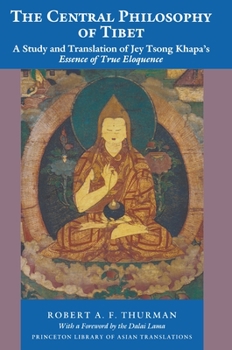The Central Philosophy of Tibet: A Study and Translation of Jey Tsong Khapa's Essence of True Eloquence
Select Format
Select Condition 
Book Overview
This is the paperback edition of the first full study, translation, and critical annotation of the Essence of True Eloquence by Jey Tsong Khapa (1357-1419), universally acknowledged as the greatest Tibetan philosopher. Robert Thurman's translation and introduction present a strain of Indian Buddhist thought emphasizing the need for both critical reason and contemplative realization in the attainment of enlightenment. This book was originally...
Format:Paperback
Language:English
ISBN:0691020671
ISBN13:9780691020679
Release Date:March 1991
Publisher:Princeton University Press
Length:476 Pages
Weight:1.55 lbs.
Dimensions:1.2" x 6.1" x 9.3"
Customer Reviews
4 ratings
Challenging but amazing book
Published by Thriftbooks.com User , 15 years ago
Again Robert Thurman is a master of expertise. THIS book will be a challenge but the more I read much easier books and then come back to this more academic version the more I grasp. It is more a scholarly text book but a thrilling addition to the "real" thing. Also It's biggest gift to me was the concept of using my intelligence and brain and mind. Up to now it was all woo-woo and still the mind. This book opens the doors to wisdom which is the other part of the equation. Compassion AND wisdom. After wading thru a few pages of copious foot notes and lecture, my brain was sparking and activated. I am blessed to have discovered it.
Relieves Suffering
Published by Thriftbooks.com User , 20 years ago
The context of the book is the thesis that belief in inherent existence (meaning, roughly, "externally self-standing, permanent, absolute, not-depending-on-anything-else" existence as opposed to "relative" or "dependent on other things" existence) is the source of suffering, because it creates bases for clinging to negative emotions. People hold this belief in many forms, applied to many things, at many levels. Detailed analysis of each instance and/or category of this belief can undermine and weaken that particular belief, and finally shatter it. This relieves the suffering associated with that instance or category of the belief, because negative emotions can no longer "stick" to the objects of the (dissolved) belief. Tsong-Ka-Pah's "Essence of Eloquence" is aimed at analyzing and shattering a form of the belief in inherent existence that operates at a deep psychological level, and yet which can still be accessed through conscious examination and logic. Tsong-Ka-Pah's claim is that this is the deepest such level of belief and corresponding analysis. Thurman's introduction compares Tsong-Ka-Pa's treatise, from the 1300's, with a similar finding by Wittgenstein in the 1900's. Seeing the thesis from these two different perspectives is helpful in "triangulating" the intended object of understanding. The material is challenging to follow as it requires developing and maintaining an experiential knowledge of subtle (yet perceivable) mental phenomena (such as "knowing") and complex relationships among these phenomena. By way of further triangulation, the material appears to address the difference between the "autonomist" schools and the "consequentialist" schools of Tibetan Buddhism that are outined in Guy Newland's "Appearance and Reality". The key area of belief that Tsong-Ka-Pa, Wittgenstein and Thurman address has to with "private languages" and the syllogisms that are based on them. The key message is that these conceptual tools inevitably reinforce the belief in inherent, as opposed to relative, existence. Because of this, private languages and the syllogisms that are based on them provide bases for attachments for negative emotions and thus sources of suffering. Accordingly, these conceptual tools eventually have to be abandoned, in terms of believing that they represent or are based on things that inherently exist, if a person is to achieve liberation from suffering, enlightenment, etc. "The Essence of Eloquence" appears to be aimed as showing exactly why private languages and the syllogisms have this flaw of reinforcing the general belief that things have inherent existence, as opposed to relative existence.
A demanding Masterpiece
Published by Thriftbooks.com User , 23 years ago
The Cental Philosophy of Tibet by Robert A. F. Thurman (Princeton) is by far the most innovative and key texts to Tsong-kha-pa's teachings and life experience as it purports to reveal Tsong-kha-pa's own account of his experience of Enlightenment and his answer to many of the intellectual muddles, hyperintllectualisms, antirationalisms that befuddled and continues to perplex many contemporary monks and Buddhist practitioners. It is a demanding read but well worth the effort.
A Feast -- But Bring Your Alka-Seltzer®
Published by Thriftbooks.com User , 24 years ago
This book is a classic in the field of Indo-Tibetan philosophy. The subject, the Essence of Eloquence, is surely one of the most difficult of all indigenous Tibetan philosophical treatises -- to understand, let alone translate. So for for translating this text we applaud Thurman, and also for his inspired introduction. But we tap our feet apprehensively at some of his polemical connivings, and we wish very much he would re-edit the translation for readability, by working more flexibly and thoroughly with good English sentences. As it stands, there is a distinct redolence about it of "I've been typing all night, the kids are up already, and the tip of my tie is in my coffee cup." The translation must be judged a great but unfinished work. QUOD EST DETERMINATUS, VIRTUTE ET NON VI!





